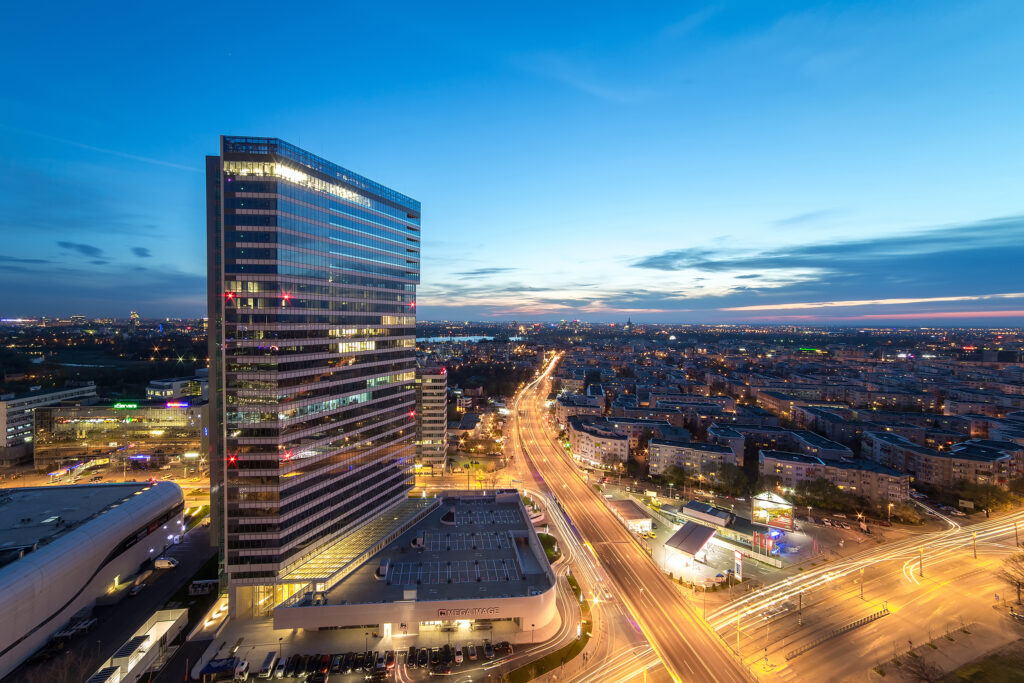Romanian Retail Snapshot 2025
- The COVID-19 had a very rapid and drastic impact on the Romanian hotel sector. According to the industry survey*, 64% of hotels were already impacted within the last week of February, when the virus was confirmed to have reached Romania. With the state of emergency having been declared on the 14th of March, the number of hoteliers** impacted increased to 98% in the 3rd week of March, ultimately reaching 100% in April.
- As international demand disappeared, the occupancy of Romanian hotels rapidly decreased to single digit numbers, causing a significant loss of income. The loss in demand resulted in average losses of EUR 25.9 per room per day in April 2020, indicating a 178% decline compared to the same period in the previous year. Recent STR reports reveal a turbulent H1 for the hospitality sector with YTD June 2020 figures recording occupancies of 26% across Romania and RevPAR levels of EUR 17, representing a 66.1% decrease compared to 2019.
- Following governmental orders to temporarily close borders and ban public gatherings, the vast majority of hotels across Romania closed. According to the survey, 75% of hotels were closed by the end of March. With restrictions being eased many hotels are re-opening again but there is still 2% of hotels that are only planing to open next year.
- In order to deal with this unprecendent crisis, hoteliers took drastic measures to reduce their costs, including staff lay-offs. According to the survey some 29% of labour was made redundant already. Given the situation has not improved meanigfully, urgent help is needed to avoid furter impact on employment in hotel sector.
Bucharest, August 2020 – A survey, prepared by Cushman & Wakefield in partnership with FIHR, targeting Romanian hoteliers** was launched in April 2020 to understand the impacts the COVID-19 pandemic holds on the commercial lodging industry. The survey asses the ways in which business have been affected while identifying the critical factors to prevail from the crisis. Cushman & Wakefield and FIHR remain committed towards ensuring that the industry receives appropriate support by collecting and analysing available data and appealing to authorities.
Hotel Sector Fighting to Survive
The first cases of the coronavirus in Romania were announced on the 26th of February 2020, causing the government to call for a state of emergency by March 14 and restrict all international travel. While the sector recorded a 5% growth in overnight stays in 2019 compared to 2018, the ongoing COVID-19 outbreak and consequent government restrictions caused an unprecedent crisis for the industry.
Taking into consideration the current market conditions and limited governmental support provided, 80% of hotels indicated being able to financially survive up to fourth months under the crisis conditions. Given that the survey was conducted between the months of April and May and that demand has not yet returned, the survival threshold for the majority of hotels will be reached in August. Although considerable efforts have been made by hoteliers to reduce operational costs, governmental support is urgently needed to protect employment in the hospitality sector.
Similar to other countries across CEE, COVID-19 required hotels in Romania to shift priorities towards reducing overall operational expenses alongside sales & marketing costs in parallel to managing the influx of booking cancellations. On a Human Resource perspective, 80% of respondents focused on utilizing the subsidized leave provided by the government to address the COVID-19 crisis. Overall, Romanian hoteliers** revealed the actions taken towards diminishing the headcount to be positioned above average in CEE with hoteliers** having reduced staff by 29% compared to a 24% average across CEE. Despite borders having reopened to the European Union as of June 1st, the difficult H1 calls for further staff reductions with combined redundancies reaching 38%.
Government Support Leaving Hoteliers** Wanting More
Romanian hotel respondents expressed the highest level of dissatisfaction amongst other CEE countries with 85% of hoteliers** stating unclear information being communicated by national authorities. Despite the satisfaction level for governmental support being relatively low, it is recorded to be higher than other CEE countries with 15% of hoteliers** being satisfied compared to 10% in other countries.
As hotels reopen and prepare themselves for a road towards recovery, uncertainty remains on the ability to benefit from the support put forward by the government. Only 25% of hoteliers** indicated having a clear understanding on how to be granted with access to the proposed support, while the vast majority remains unsatisfied with the ease of accessibility to such aid.
While in many other countries governments already announced a specific help to tourism and hotel sector, for example direct financial grants in the Czech Republic, travel vouchers in Poland and aggressive campaigns promoting domestic tourism in Germany, there has been limited help to Romanian hotels so far.
The Road Towards Recovery
In the weeks between April 24th and May 25th, 75% of hoteliers** expressed being either ready or extremely ready to reopen their properties, with 87% being confident on being able to ensure the safety of both guests and employees. As hotels have reopened and others continue to prepare for reopening, hoteliers** in Romania have expressed placing the safety of guests and employees at the heart of their strategies towards recovery. With COVID-19 causing major concerns among travellers and hotel personnel, the vast majority of respondents indicated being in favour of a new health and safety certification being established in Romania.
Looking ahead
The opening of European borders and lifting of travel restrictions has enabled the majority of hotels to re-open and enter the recovery phase despite the limited support provided by authorities. While very soft demand remains of most concern, hoteliers will also face challenge caused by increasing supply with several notable additions expected to open throughout the summer season.
In comparison with other markets in CEE, Romanian hotels are less depended on international demand with nearly 80% of arrivals being domestic. While this factor will certainly help with the recovery, the slow anticipated return of business travel remains a concern, due to corporate demand acting as a major driver of occupancy in Romania. Nonetheless, multinational companies have recently expressed interest in relocating to Romania which will contribute towards boosting business demand on the medium to long term.
In addition, while likely to primarily impact hotels in Bucharest, the European Football Championship planned for next year is hoped to have a positive impact on hotel performances and mark the recovery process towards driving healthy occupancy and ADR levels.
The long-term outlook for the Romanian hotel sector remains positive, underpinned by the healthy tourism growth in recent years as well as continuous attractiveness of the country for international businesses, driving corporate and conference demand. Nevertheless, according to Oxford Economics, the number of nights in paid accommodations in Bucharest is expected to reach pre-crisis levels only between 2023 and 2024, but show a healthy growth in the following years.
Cushman & Wakefield Echinox is a leading real estate company on the local market and the exclusive affiliate of Cushman & Wakefield in Romania, owned and operated independently, with a team of over 60 professionals and collaborators offering a full range of services to investors, developers, owners and tenants.
Cushman & Wakefield, one of the global leaders in commercial real estate services, with 53,000 employees in over 60 countries and € 8.8 billion in revenue, provides asset and investment management consulting services, capital markets, leasing, properties administration, tenant representation, design and evaluation services. For more information, visit www.cushmanwakefield.com.
FIHR (Romanian Hospitality Industry Federation) is the first and most representative organization for the Romanian tourism and the hotel industry, in terms of turnover and employees’ number, gathering 4 of the top 5 Romanian hotel companies ranked by turnover, present in 31 local cities and covering about 10,000 rooms within its membership hotels.
FIHR is affiliated to Concordia Employers’ Confederation and is representative for Romania’s business environment, gathering the strongest sectoral federations in the Romanian economy and comprising 7 of the top 10 companies in terms of employees and turnover. Concordia is the only Romanian employers’ confederation affiliated to the International Organization of Employers and Business Europe.
FIHR is a founding member of the Alliance for Tourism (APT) – an informal structure formed voluntarily, including 21 employer-professional organizations relevant for the Romanian tourism. APT is built as a formal cooperation platform dedicated to its members, organizations that aim to develop the Romanian tourism sector in Romania, respecting the legal and ethical business principles.
In 2020, the Romania’s Development Coalition (CDR) is coordinated by Călin Ile, President of FIHR, observer member of HOTREC.
FIHR is observer member of HOTREC – the umbrella Association of Hotels, Restaurants, Bars and Cafes and similar establishments in Europe, which brings together 45 National associations in 33 countries, and is the voice of the hospitality industry in Europe.





